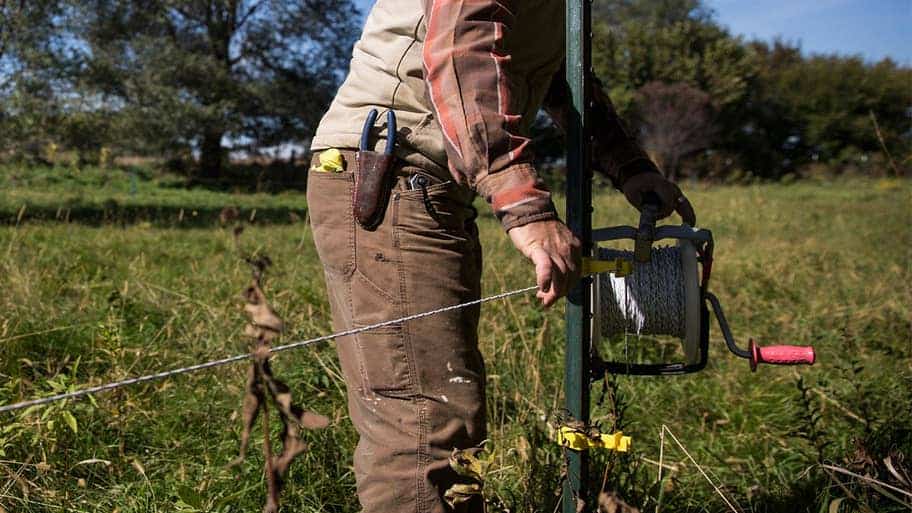We can help you with the installation of a new electric fence or the extension of an existing one. An electric fence is a barrier made out of metal pieces that are charged with electricity. It is constructed in such a way that any person or animal attempting to pass through it will be shocked. The shock isn’t meant to kill the animals or people; rather, it’s meant to keep them inside or outside the barrier.
An electric fencing system is made up of several components. Each of these factors is critical in ensuring that the fence is set up in such a way that it can provide a shock in the event of a break-in attempt. The following are some of the most important components of an electric fence installation:
- Posts
- Warning
- Signs
- Cables and Wires
- Insulators
- Batteries
- Energizers
- Various accessories
- Brackets
Because all electric fences must be installed, operated, and maintained in accordance with the Electric Fence rules, it is critical that you hire a trustworthy business to do so.

Electric fence installation types:
Electric fencing systems are divided into three categories:
Piggyback: Then there’s the installation of a piggyback electric fence. When an electric fence is built on top of an existing fence, the region becomes more secure. The piggyback profile is riveted or screwed to the existing fence post (pillars or palisade fence). As a result, the electric fences are supported by the current fence’s construction and strength.
Top of the wall: Then there’s the installation of an electric fence on the top of a wall. The electric fence is mounted to the top of an existing perimeter barrier, such as a masonry or precast concrete wall, in this case. Self-contained:
Finally, a stand-alone electric fence can be installed. This is where the electric fence is the only thing standing in the way.
WHAT EVERY ELECTRIC FENCING INSTALLER SHOULD BE TAKING INTO ACCOUNT
Electric fences are a popular security solution for commercial, industrial, and residential installations in South Africa, but many property owners are unaware of the legal requirements for their electric fencing if any exist at all.
While electric fencing may be the most effective technique of deterring burglars, it should be kept in mind that, unlike alarm systems and CCTV cameras, it is potentially deadly.
Why is it necessary to enact new regulations regarding electric fencing?
Although there was legislation in the 1980s permitting non-lethal electric fences, they were mostly uncontrolled because they were mostly used on farms. Then, when electric fences became increasingly prevalent in cities and suburbs, a new regulation was needed to safeguard the public. At the time, the legislation’s “loopholes” were being exploited by a proliferation of “electric fence installers,” with every Tom, Dick, and Harry jumping on board and erecting electric fences — and the unwary public having no means of knowing whether their fences were safe and/or compliant.
The changes tightened the sector by requiring electric fence technicians to complete rigorous training before registering as an Electric Fence System Installer with the Department of Labor.
The new legislation has far-reaching consequences for property owners as well.
Can I install electric fencing myself?
Only a registered electrician who is also qualified in terms of the electric fence legislation and has been registered as an Electric Fence Installer with the Department of Labor (DoL) can install an electric fence system.
Electric fence installations can only be done – and a Certificate of Compliance obtained – by a certified Electric Fence System Installer (EFSI) in compliance with the Occupational Health and Safety Act’s Electrical Machinery Regulations (85 of 1993).
Before enabling the installer to install an electric fence system on the property and issue the EFC, the property owner should establish that the installer is truly registered.
What if I don’t have an electric fence certificate?
When a Department of Labour inspector asks for an EFC, you must produce it.
Property owners, body corporates, commercial organizations, and homeowner associations become civilly and criminally liable for damage caused by their electric fence system if they do not have a valid Electric Fence System Certificate of Compliance.
If an electric fence is discovered to be non-compliant, the owner must have the system modified by a registered installation to conform with the legislation within a certain time frame, or the entire system will be removed.
Most crucially, non-compliance can result in significant financial penalties for property owners who file an insurance claim for a damaged electric fence, stolen household belongings, or who are on the receiving end of a personal liability claim and are also facing criminal accusations.
The insurance company may not pay out if the electric fence system is not compliant and/or does not have an EFC and the fence is damaged, for example, by a falling tree or the energizer is destroyed by lightning. If a visitor, employee, or neighbor’s child is shocked or wounded by the fence and the property owner lacks the requisite EFC, a personal liability action might be disastrous.
Landowners should pay particular attention to the following legislation:
- Electric fences that are closer than 20 meters to a parking space require extra care. It is illegal to have live wires that are less than 1.5 meters above ground level.
- In other words, a barrier fence or bottom wires must be present below 1.5m. Alternatively, a monitoring energizer with a low voltage output must power the bottom wires.
- Tandem Security Systems offers an energizer that monitors lines below 1.5 meters and provides all of the benefits of an electric fence without the risk of shocking anyone. The alarm will sound if the fence is cut or shorted.
- The South African Bureau of Standards has the most recent version of SANS 10222-3: 2012. This is the legal document that the OHS act enforces.
- When installing a fence, various rules must be followed, such as PUBLIC AREAS.
- Maximum voltage: – a When the peak voltage of a pulsed system surpasses 50V DC or AC, it is referred to as a high tension electric fence.
- A person is not isolated from pulsed conductors below 1.5m by a physical barrier in a secure location.
Q&A

- What will it cost to fix the problem? We have to charge a service call to cover the cost of moving a crew from another location to where the work has to be done. Half an hour of labor is included in the service call. Because our employees are well-trained, they can usually resolve the issue within minutes. If it appears that it will take a long time, we will provide the client a quote first. An hourly rate will be applied if the client agrees. The cost of the materials will be paid separately.
- I’m selling my home and need a certificate of occupancy. What would the cost be if TSS did not erect the fence? A charge for inspection must be paid. Only the cost of issuing the certificate and the inspection fee will be due if the fence complies with the regulations. There will be no additional call-out cost if work is required to bring the fence into compliance. Only the cost of materials and labor will be considered. The certificate will have a cost associated with it. It will be delivered to clients in printed form. After payment, the COC will be issued.
- Tandem Security Systems offers what kind of guarantee on electric fences? Our handiwork is covered by a one-year warranty. The guarantee for the material used can be found on the manufacturing company’s website.
- What should I do if my fence requires maintenance after my guarantee period has expired? You are welcome to call us again, and we will take care of the issue.
- Is it possible for an electric fence to harm my cat or dog? – No. Electric fences operate on non-lethal direct current (DC). That is why there are laws in place to ensure the safety of electric fences.
- When does an electric fence emit a warning signal? When the live wires have become short. That is why the installation must be done by a qualified company.
- What role does the Department of Labour play in South Africa when it comes to electric fences? The Official Regulator is the Department of Labor. They are in charge of the health and safety aspects of the project.
Looking for some help?
- Electric Fence Installers Johannesburg
- Electric Fence Installers Krugersdorp
- Electric Fence Installers Roodepoort
- Electric Fence Installers Midrand
- Electric Fence Installers Randburg
- Electric Fence Installers Fourways
- Electric Fence Installers Sandton
- Electric Fence Installers Germiston
- Electric Fence Installers Kempton Park
- Electric Fence Installers Boksburg
- Electric Fence Installers Alberton
- Electric Fence Installers Benoni


